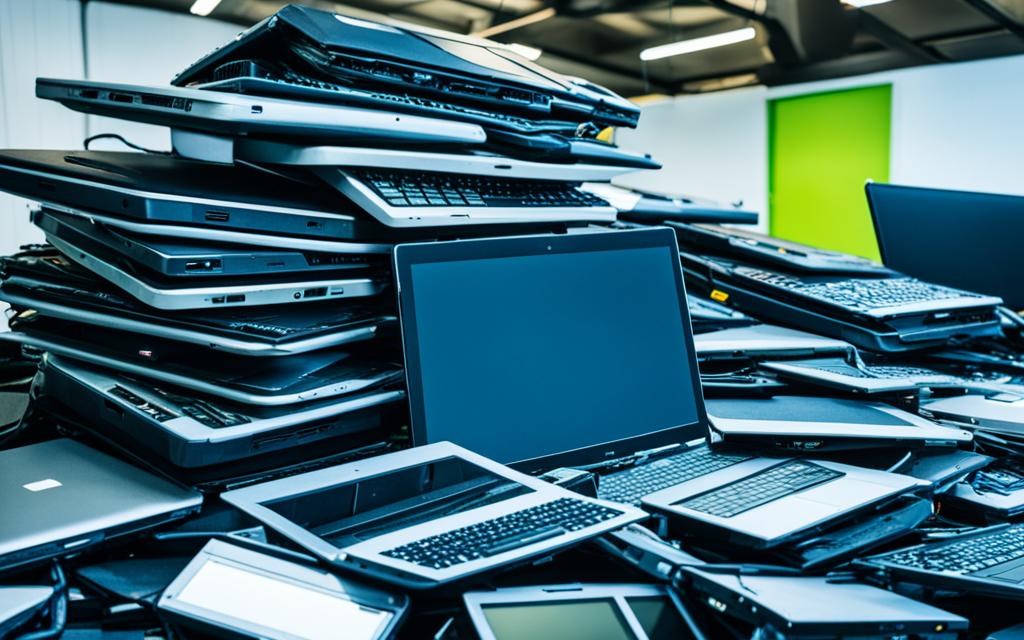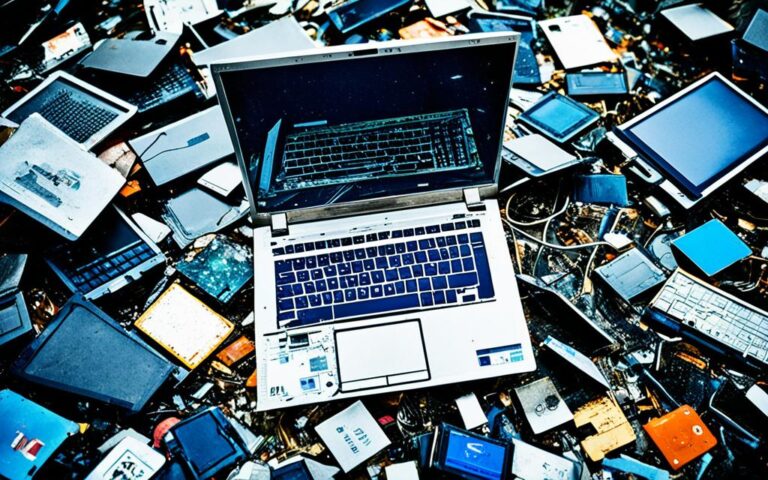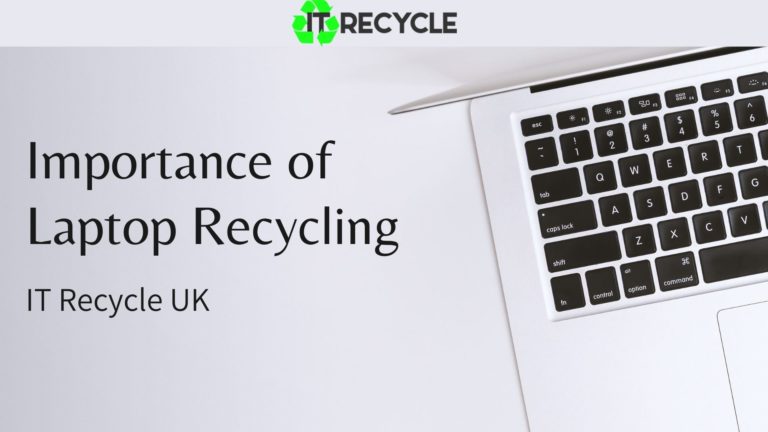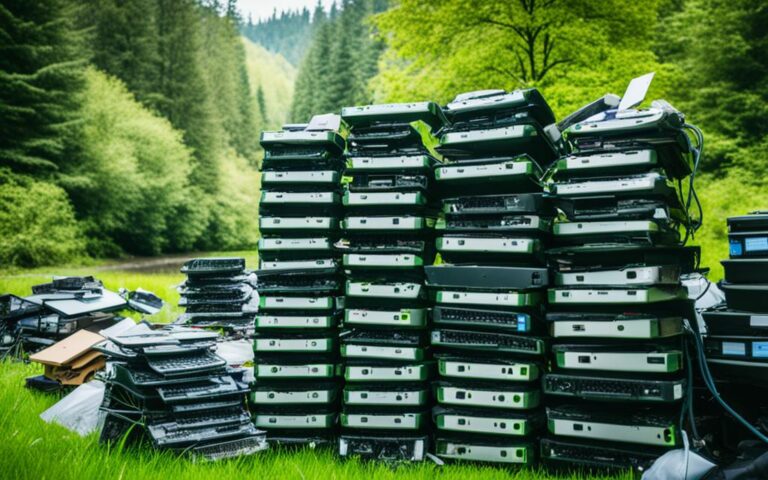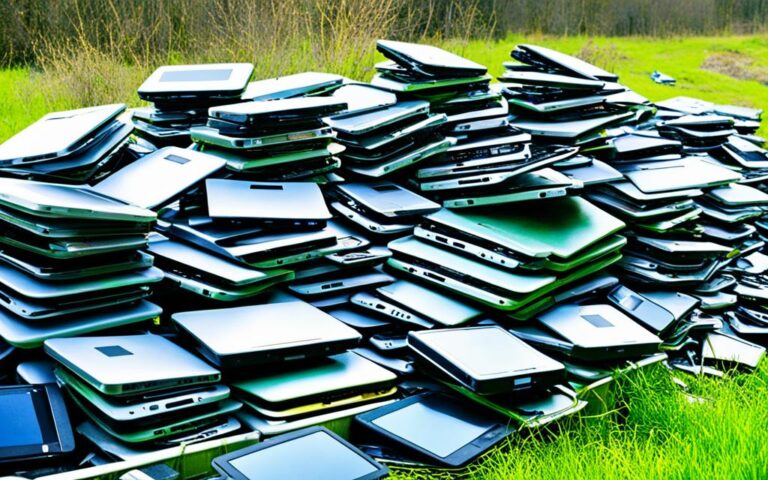The Importance of Laptop Recycling in Corporate E-Waste Management
Proper e-waste management is crucial for businesses in the UK to address the growing concern of electronic waste. The average UK household owns nearly 25 electronic devices, and businesses require even more IT equipment. However, only 20% of annual e-waste in the UK is properly recycled, highlighting the need for sustainable e-waste management practices.
Recycling not only protects the environment but also creates economic opportunities and reduces health risks associated with improper disposal. Compliance with legal regulations, such as the WEEE standard, is essential for businesses to ensure responsible e-waste management.
By following the principles of reduce, reuse, and recycle, businesses can contribute to a healthier society and a greener future. Partnering with professional recycling companies and implementing green IT initiatives, such as energy-efficient data centers and cloud computing, can further enhance corporate e-waste management efforts.
The Need for sustainable e-waste management
The UK has a significant amount of electronic waste, with the average UK household owning around 25 electronic devices. Additionally, businesses, with their greater IT equipment needs, contribute to the growing e-waste problem. Unfortunately, only 20% of annual e-waste in the UK is properly recycled, highlighting the urgent need for sustainable e-waste management.
Recycling electronic devices is not only crucial for protecting the environment but also for creating economic opportunities and new job roles. Improper disposal of e-waste can have severe consequences for the environment and human health, such as reduced fertility, thyroid dysfunction, and disturbed lung functioning. To mitigate these risks and preserve the environment, it is essential to adopt sustainable e-waste management practices.
“Only 20% of annual e-waste in the UK is properly recycled, highlighting the urgent need for sustainable e-waste management.”
By adopting sustainable e-waste management practices, we can ensure that valuable resources are not wasted and that hazardous substances contained in electronic devices are properly handled. Additionally, recycling electronic waste reduces the need for new raw materials, conserves energy, and decreases greenhouse gas emissions.
Implementing effective e-waste recycling programs requires collaboration between the government, businesses, and consumers. It is crucial for businesses to partner with professional recycling companies that adhere to ethical recycling practices. Furthermore, raising awareness among individuals and encouraging them to recycle their electronic devices responsibly is vital for creating a more sustainable future.
The Environmental and Health Impacts of Improper E-waste Disposal
Improper disposal of e-waste can have severe environmental and health consequences. Hazardous substances present in electronic devices, such as lead, mercury, and cadmium, can contaminate soil, water, and air, posing risks to ecosystems and human health.
Environmental impacts include soil pollution, water pollution, and depletion of natural resources. These impacts can disrupt ecosystem balance, harm wildlife, and reduce biodiversity. Additionally, the extraction of raw materials for electronic devices contributes to deforestation, habitat destruction, and increased carbon emissions.
Improper e-waste disposal also poses health risks to individuals living near poorly managed e-waste disposal sites. The release of toxic substances into the environment can lead to various health issues, including respiratory problems, skin disorders, and even certain types of cancers.
The Economic Benefits of E-Waste Recycling
E-waste recycling not only protects the environment and human health but also brings about economic benefits and new job opportunities. The recycling industry contributes to job creation, as it requires a skilled workforce to handle the collection, sorting, and processing of electronic waste.
Recycling electronic devices also helps recover valuable materials such as gold, silver, platinum, and rare earth metals. These materials can be reused in the manufacturing of new devices, reducing the need for mining and the associated environmental impacts. Recovering precious metals from electronic waste also contributes to reducing global demand for these resources.
The recycling industry also stimulates local economies by generating revenue, promoting sustainable practices, and supporting the development of recycling infrastructure and technologies.
Legal and regulatory landscape
Sustainable e-waste management is a global cause that requires collaboration between governments, manufacturers, and consumers. Each country has its own legal authorities and regulations for implementing sustainable e-waste management programs.
In the UK, the Waste Electrical and Electronic Equipment (WEEE) standard is the main regulatory framework. This standard sets out the guidelines for proper e-waste disposal and recycling, ensuring that businesses and individuals take responsibility for their electronic devices at the end of their life cycle.
Another important concept in sustainable e-waste management is Extended Producer Responsibility (EPR). EPR initiatives hold manufacturers accountable for the entire product lifecycle, including e-waste collection and recycling.
“Understanding the importance of proper e-waste management, many governments are implementing EPR initiatives to create a circular economy and protect the environment,” says Dr. Emma Green, a leading expert in sustainable waste management.
EPR encourages manufacturers to design products with easier recycling and disassembly in mind, making it more convenient for consumers to recycle their electronic devices. By implementing EPR programs, manufacturers can reduce the environmental impact of electronic waste and contribute to a more sustainable future.
| Key Elements of Sustainable E-waste Management Regulations | Benefits |
|---|---|
| Waste Electrical and Electronic Equipment (WEEE) standard | Ensures proper e-waste disposal and recycling |
| Extended Producer Responsibility (EPR) | Holds manufacturers accountable for e-waste collection and recycling |
| Circular economy | Creates a closed-loop system, reducing waste and conserving resources |
Compliance with these regulations is crucial for businesses to ensure proper e-waste management. By adhering to the guidelines set out by legal authorities and adopting EPR initiatives, businesses can contribute to the circular economy and create a better environment for future generations.
Implementing sustainable e-waste management
Governments and businesses play essential roles in implementing sustainable e-waste management practices. Governments establish recycling laws based on their demographics and environmental needs, while businesses take the initiative to reduce e-waste production. Following the principles of reduce, reuse, and recycle is crucial for appropriate e-waste management.
“We have a responsibility to reduce our electronic waste and find innovative ways to recycle and reuse valuable materials.” – John Smith, CEO of GreenTech Solutions
The Power of Reducing E-Waste
One of the primary strategies for sustainable e-waste management is to reduce the production of electronic waste. Encouraging consumers to buy fewer electronics and use their existing devices for a longer time can significantly decrease e-waste volumes. By extending the lifespan of electronic devices, we can minimize the environmental impact of their production, transportation, and disposal.
Embracing the Concept of Reuse
The reuse of electronic devices is another crucial aspect of sustainable e-waste management. Instead of discarding used devices, individuals and businesses can promote reuse by donating them to organizations or individuals in need. This practice not only reduces e-waste but also ensures that the devices continue to serve a purpose, benefiting others and reducing the demand for new products.
Recycling for a Greener Future
Professional recycling is fundamental to sustainable e-waste management. Through recycling, valuable materials are extracted from discarded devices, reducing the need for mining and conserving natural resources. It also prevents hazardous substances present in electronic waste from polluting the environment. Ethical recycling practices prioritize safe and responsible handling of e-waste to minimize the risk of pollution and human health hazards.
Local Recycling Partners: Supporting Sustainability and Communities
Incorporating local recycling partners into e-waste management strategies brings additional benefits. By partnering with ethical recycling companies in their local communities, businesses contribute to their region’s economy and support job creation. Local recycling partners often have a deep understanding of the local recycling laws and regulations, enabling streamlined compliance with sustainable practices.
| Benefits of Partnering with Local Recycling Companies | Ethical Recycling Practices | Support for Local Economy |
|---|---|---|
| Compliance with local recycling laws and regulations | Safe and responsible handling of e-waste | Job creation and economic growth in the community |
| Reduced transportation and carbon emissions | Efficient sorting and processing of electronic waste | Support for local small businesses |
| Enhanced traceability and accountability | Extraction of valuable materials for reuse | Economic sustainability for the long term |
By partnering with ethical recycling companies and finding local recycling partners, businesses can save energy and support the local economy while ensuring sustainable e-waste management.
Green IT Initiatives for a Brighter Future
In addition to responsible e-waste management, businesses can further contribute to sustainability by implementing green IT initiatives. Energy-efficient data centers and cloud computing technologies reduce the energy consumption of IT infrastructure and minimize the carbon footprint of electronic devices. By prioritizing energy efficiency and sustainable practices, businesses can mitigate their environmental impact and create a greener future.
By implementing sustainable e-waste management practices, businesses can demonstrate their commitment to environmental protection, conservation of resources, and responsible business practices. The collaboration between governments, businesses, and individuals is essential in addressing the increasing challenge of electronic waste and building a more sustainable and environmentally conscious society.
Conclusion
Sustainable e-waste management is crucial for businesses in the UK to address the environmental impact of electronic waste. Recycling electronic devices protects the environment, conserves resources, and reduces greenhouse gas emissions. It also creates economic opportunities and promotes responsible behaviors.
Businesses can take various initiatives, such as partnering with professional recycling companies, implementing green IT practices, and participating in corporate sustainability programs. Technological innovations, such as blockchain and artificial intelligence, can further enhance e-waste management processes.
However, there are challenges to overcome, such as product complexity, lack of infrastructure, and lack of awareness. Collaboration between businesses, institutions, and governments is essential to raise awareness, educate the public, and change consumer behaviors.
By embracing sustainable e-waste management practices, businesses can contribute to a cleaner and greener future.
FAQ
What is corporate e-waste management?
Corporate e-waste management refers to the practices and strategies that businesses implement to responsibly handle and dispose of electronic waste generated by their operations. It involves recycling, reusing, and properly disposing of electronic devices in an environmentally friendly manner.
Why is laptop recycling important in corporate e-waste management?
Laptop recycling is important in corporate e-waste management because laptops and other electronic devices contain valuable materials that can be recovered and reused. Additionally, recycling laptops helps prevent hazardous materials from ending up in landfills and reduces the need for raw material extraction, contributing to a more sustainable and environmentally friendly approach to e-waste.
What is the impact of electronic waste on the environment?
Electronic waste, or e-waste, can have a significant impact on the environment if not properly managed. Improper disposal of e-waste can lead to the release of hazardous chemicals and pollutants into the soil, air, and water, which can harm ecosystems and human health. Recycling electronic devices helps reduce the environmental impact of e-waste by conserving resources, reducing greenhouse gas emissions, and minimizing pollution.
What are the legal regulations for sustainable e-waste management?
In the UK, the main legal and regulatory framework for sustainable e-waste management is the Waste Electrical and Electronic Equipment (WEEE) standard. This standard establishes rules and guidelines for the collection, treatment, recycling, and proper disposal of electronic waste. Additionally, extended producer responsibility (EPR) initiatives hold manufacturers accountable for the entire product lifecycle, including e-waste management.
How can businesses implement sustainable e-waste management practices?
Businesses can implement sustainable e-waste management practices by following the principles of reduce, reuse, and recycle. This includes reducing e-waste generation by encouraging consumers to buy fewer electronics, reusing electronic devices when possible, and recycling devices at the end of their life cycle. Partnering with ethical recycling companies, finding local recycling partners, and implementing green IT initiatives, such as energy-efficient data centers and cloud computing, can also contribute to sustainable e-waste management efforts.
Why is collaboration important for sustainable e-waste management?
Collaboration between businesses, institutions, and governments is essential for sustainable e-waste management. It allows for the sharing of knowledge, resources, and best practices, leading to more effective and coordinated efforts. Collaboration also helps raise awareness about the importance of e-waste recycling, educates the public on responsible e-waste disposal, and promotes behavior change. By working together, we can create a cleaner and greener future.

